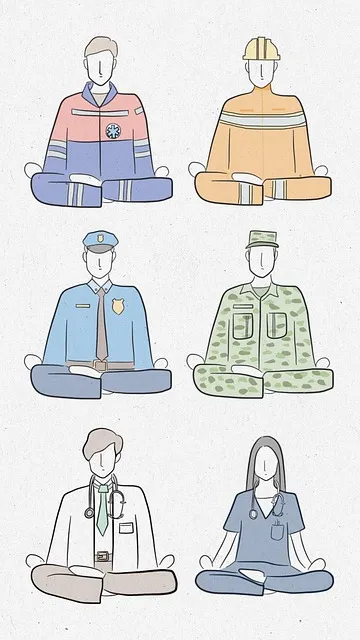Longmont Kaiser Permanente psychiatry offers specialized Crisis Intervention Team (CIT) training, empowering healthcare professionals and first responders with advanced crisis management skills. Through interactive workshops, simulations, and conflict resolution techniques, CIT members enhance empathy building and mental wellness coaching abilities. This program ensures mental health crises are handled with care, proficiency, and compassion, improving risk assessment and outcomes within the community.
In today’s complex healthcare landscape, effective crisis intervention is vital. This article explores comprehensive crisis intervention team (CIT) training programs, with a focus on the specialized approach implemented by Longmont Kaiser Permanente Psychiatry. We delve into the essential skills required for successful crisis management, highlighting real-world applications that demonstrate CIT’s impact. Understanding these programs is crucial for healthcare professionals aiming to provide compassionate and efficient care during critical situations, particularly in psychiatric settings like Longmont Kaiser Permanente.
- Understanding Crisis Intervention Team (CIT) Training
- Longmont Kaiser Permanente Psychiatry: CIT Specialization
- Essential Skills for Effective Crisis Management
- Real-World Applications: CIT in Action
Understanding Crisis Intervention Team (CIT) Training

Crisis Intervention Team (CIT) training programs are designed to equip healthcare professionals, first responders, and other community members with the skills needed to effectively handle mental health crises. These programs, often offered by institutions like Longmont Kaiser Permanente psychiatry departments, focus on developing a comprehensive understanding of crisis situations. Participants learn essential Conflict Resolution Techniques to defuse tense scenarios and foster open communication.
Through interactive workshops and simulations, trainees gain Empathy Building Strategies, allowing them to connect with individuals experiencing crises on a deeper level. Additionally, these programs delve into Mental Wellness Coaching Programs Development, teaching participants how to provide immediate support while also connecting individuals with longer-term care options. CIT training empowers individuals to make a significant impact in their communities by ensuring that mental health crises are handled with care, proficiency, and compassion.
Longmont Kaiser Permanente Psychiatry: CIT Specialization

Longmont Kaiser Permanente Psychiatry offers a unique and specialized program focused on Crisis Intervention Team (CIT) training. This initiative is designed to empower mental health professionals in navigating crises effectively, ensuring a crucial aspect of public safety and mental healthcare support. The program delves into advanced strategies for mood management, risk assessment, and crisis de-escalation techniques.
Through interactive sessions and real-world scenarios, participants gain invaluable experience in handling high-stress situations. This training goes beyond basic CIT protocols, incorporating aspects like public awareness campaigns development to foster a community that understands and supports mental health crises. By enhancing the skills of Longmont Kaiser Permanente’s psychiatry team, the program contributes to better risk assessment for mental health professionals, ultimately improving outcomes for those experiencing severe emotional distress.
Essential Skills for Effective Crisis Management

In crisis intervention situations, effective communication is key. Team members must possess strong listening skills to understand the immediate needs and concerns of individuals in distress, which is particularly crucial at facilities like Longmont Kaiser Permanente psychiatry. This involves active listening, reflecting emotions, and asking open-ended questions to foster a safe space for expression. Additionally, empathy is vital; the ability to recognize and share the feelings of others helps build rapport and trust, enabling a more collaborative approach to crisis management.
Beyond communication, crisis intervention teams require skills in emotional regulation. Team members should be adept at managing their own emotions during high-pressure situations, ensuring they can remain calm and composed while providing support. This skill, often enhanced through mental health awareness training, contributes to better decision-making and a more stable environment. Furthermore, confidence boosting techniques within the team dynamic can significantly impact overall performance, promoting swift and effective crisis resolution.
Real-World Applications: CIT in Action

In real-world settings, Crisis Intervention Teams (CIT) play a pivotal role in psychiatric emergency situations, particularly at facilities like Longmont Kaiser Permanente psychiatry. These teams are designed to de-escalate critical scenarios involving individuals experiencing severe mental health crises. CIT members, often comprising mental health professionals and first responders, receive specialized training to handle such situations effectively. The program equips them with the skills to assess risk, provide immediate support, and connect individuals to appropriate long-term care options.
Through practical exercises and simulations, CIT trainees learn to apply evidence-based practices tailored for crisis management. This includes conducting a thorough Risk Assessment for Mental Health Professionals, which is crucial in understanding the individual’s history and potential risks. Additionally, public awareness campaigns development and promoting Self-Care Practices among team members are integral aspects of maintaining a healthy work environment while addressing high-stress situations.
Crisis intervention team (CIT) training programs, like those offered by institutions such as Longmont Kaiser Permanente Psychiatry, equip professionals with vital skills for managing crises effectively. By focusing on empathy, de-escalation techniques, and communication strategies, these programs foster a culture of care within healthcare settings. The real-world applications of CIT, as demonstrated in various scenarios, underscore its potential to minimize harm and promote positive outcomes for individuals facing mental health crises. Through specialized training like that provided by Longmont Kaiser Permanente, healthcare professionals can better navigate challenging situations, ultimately enhancing the quality of care they deliver.






